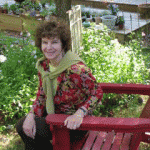Deborah Hopkinson has two full-time jobs, writer and professional fundraiser. Her readers know her award-winning picture books, nonfiction, and novels, and her university colleagues know her talents as the Vice President for College Advancement at Pacific Northwest College of Art in Oregon. As the primary breadwinner in her household, she cannot forego the health benefits of full-time employment, so she carves out chunks of time for writing. “I make lists,” she says. “I tend to work on weekends and a little bit in the evenings on shorter things, or I divide what I have to do in smaller pieces.”
As a young mother employed as a development officer for the University of Hawaii, Hopkinson read children’s books to her three-year-old daughter. “I always knew I wanted to write, but I didn’t know what or how to go about it with my family responsibilities,” she says. One year she made a New Year’s resolution—submit a piece of writing to a publisher every month. She persevered for two years collecting rejection letters before deciding on a different strategy. One of the few writing workshops that she successfully squeezed into her already-packed schedule included a session on writing for children’s magazines. Hopkinson gave it a try and sold her first story to Cricket Magazine. The strategy worked; in two years she sold her first book, Sweet Clara and the Freedom Quilt.
While in college, Hopkinson was drawn to women in history. “Looking for stories about girls led me to become more interested in history,” she explains. Scrolling through the results for a “women in history” search of the library catalog led her to Maria Mitchell, the first female astronomer. “I had never heard of her,” Hopkinson says, her curiosity planting the seed for Maria’s Comet.
Hopkinson likes to go beyond what’s in history textbooks, preferring the information in the shaded boxes to the actual chapter text. “Keeping my antennae up” is how Hopkinson describes the idea stage of a story. Sweet Clara and the Freedom Quilt came from an NPR story about a quilt exhibition commemorating the first African-American graduate of Williams College. Stagecoach Sal, an upcoming book, gelled when Hopkinson visited the Wells Fargo Foundation in a fundraising capacity and happened upon an exhibit that featured women in history. Among them was the first female stagecoach driver in California. Hopkinson’s newest book, Abe Lincoln Crosses A Creek, is a culmination of things she’d been thinking about in previous books. “I’ve been trying to do more on historical literacy, helping kids think about history and get excited about history.” Because most of her characters are anchored in the past, she says, “I put myself in the shoes of the person I’m writing about, knowing as much about the time period, reading that person’s writing, and trying to imagine what I have in common with that person, and how things might be different in that time period.”
With over 30 books published, Hopkinson is still rejected by editors. “A lot of what I’ve done in my professional career has helped me as a writer,” she says. “In fundraising, sometimes my proposals are rejected, not because it’s a bad project but because it doesn’t fit the needs of the foundation. It’s the same with editors. They all have different goals for what they are trying to do. It’s part of the way the publishing world works. You throw out ideas and realize not all of them are going to work.” Hopkinson cautions new writers that one story is not enough. You must approach writing like a professional and be open to looking at your story in a new way based on an editor’s suggestions. During the revision process Hopkinson may go back and forth with her editor producing nine revisions before the manuscript is finally completed. “I do a lot of grant proposals with fundraising and you get very used to writing collaboratively.”
Hopkinson sees children’s literature as a special gift for our children. “We read to kids when they’re little,” she says, “but I always think of having children as having the opportunity to have a lifelong book club. Once kids start reading on their own, parents don’t keep reading the same books.” Hopkinson encourages us to pass on books to our older children. “Continue to read with kids even once they’re reading on their own.”


